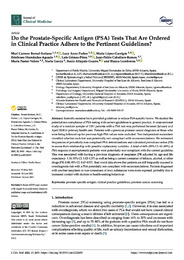Por favor, use este identificador para citar o enlazar este ítem:
https://hdl.handle.net/11000/35356
Do the Prostate-Specific Antigen (PSA) Tests That Are Ordered in Clinical Practice Adhere to the Pertinent Guidelines?
Título :
Do the Prostate-Specific Antigen (PSA) Tests That Are Ordered in Clinical Practice Adhere to the Pertinent Guidelines? |
Autor :
Bernal-Soriano, Mari Carmen 
Parker, Lucy Anne 
López-Garrigós, Maite
Hernández-Aguado, Ildefonso 
Gómez-Pérez, Luis 
Caballero-Romeu, Juan-Pablo 
Pastor-Valero, Maria 
García, Nuria
Alfayate-Guerra, Rocío
Lumbreras, Blanca |
Editor :
MDPI |
Departamento:
Departamentos de la UMH::Salud Pública, Historia de la Ciencia y Ginecología
Departamentos de la UMH::Patología y Cirugía |
Fecha de publicación:
2021-06-16 |
URI :
https://hdl.handle.net/11000/35356 |
Resumen :
Scientific societies have provided guidelines to reduce PSA-specific harms. We studied the potential non-compliance of PSA testing with current guidelines in general practice. A cross-sectional study of a random sample of 1291 patients with a PSA test was performed between January and April 2018 in primary health care. Patients with a previous prostate cancer diagnosis or those who were being followed-up for previous high PSA values were excluded. Two independent researchers classified whether each test was potentially non-compliant with recommendations. We estimated frequencies of potentially non-compliant PSA determinations and calculated prevalence ratios (PR) to assess their relationship with possible explanatory variables. A total of 66% (95% CI: 62-69%) of PSA requests in asymptomatic patients were potentially non-compliant with the current guideline. This was associated with having a previous diagnosis of neoplasm (PR adjusted by age and life expectancy: 1.18; 95% CI: 1.02-1.37) as well as being a current consumer of tobacco, alcohol, or other drugs (PR: 0.80; 95% CI: 0.67-0.97). Real world data shows that patients are still frequently exposed to overdiagnosis risk with a PSA potentially non-compliant with recommendations. Patients diagnosed with another neoplasm or non-consumers of toxic substances were more exposed, probably due to increased contact with doctors or health-seeking behaviour.
|
Palabras clave/Materias:
clinical practice guidelines
prostate cancer
prostate-specific antigen
screening |
Tipo de documento :
info:eu-repo/semantics/article |
Derechos de acceso:
info:eu-repo/semantics/openAccess
Attribution-NonCommercial-NoDerivatives 4.0 Internacional |
DOI :
10.3390/jcm10122650 |
Publicado en:
J Clin Med . 2021 Jun 16;10(12):2650 |
Aparece en las colecciones:
Artículos Patología y Cirugía
|
 La licencia se describe como: Atribución-NonComercial-NoDerivada 4.0 Internacional.
La licencia se describe como: Atribución-NonComercial-NoDerivada 4.0 Internacional.

 La licencia se describe como: Atribución-NonComercial-NoDerivada 4.0 Internacional.
La licencia se describe como: Atribución-NonComercial-NoDerivada 4.0 Internacional.
.png)